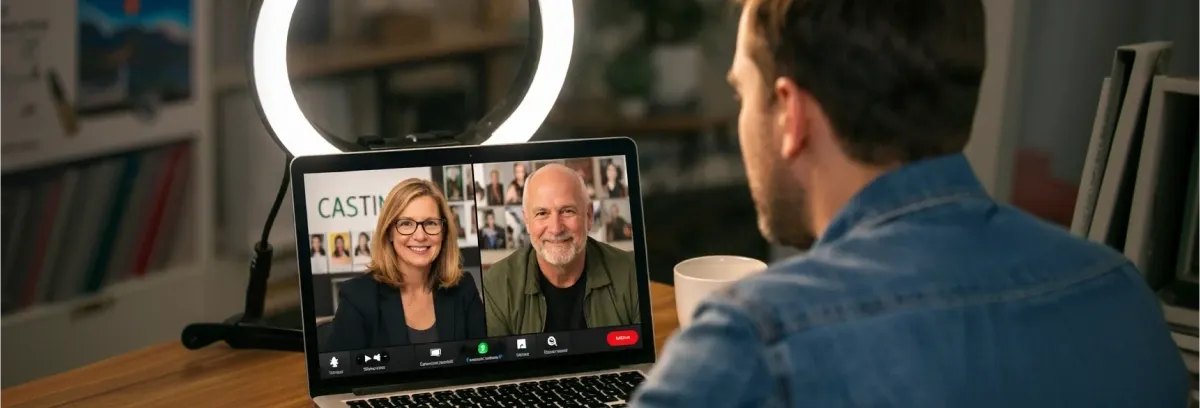- What Is Cold Reading?
- Cold Reading Examples.
- Cold Reading Technique.
- What to Expect at a Cold Read Audition?
- How Do You Approach a Cold Read?
- How to Prepare for a Cold Read Audition?
What Is Cold Reading?
Cold reading is a practice where the actor must perform a script, scene, or text with little or no advance preparation.
The actors are handed a script and expected to familiarize themselves with the text within a short period and present a great performance.
Viola Spolin introduced this practice as part of her Theatre Games program in the 1940s to encourage freedom of expression and help the actors organically create action and character development with their scene partners on the spot.
It is also known as Sight reading and is employed in auditions for all mediums, including theater, film, television, and commercials.
Cold Reading Examples
You can look for cold reading audition examples in a few different places.
One option is to find online resources that provide samples of cold reading scripts. This can be a great way to get a feel for the style of cold reading and see how other actors approach the material.
Another option is attending workshops or classes focusing on cold reading. This can allow you to practice your skills in a safe and supportive environment.
Finally, you can always ask a friend or family member to read lines with you so that you can get some experience performing cold readings. Whichever method you choose, make sure you take the time to prepare to give your best audition possible.
Cold Reading Techniques
Some tips can be implemented in the performance for a successful cold reading presentation. Here are some techniques to help you out:
- Practice ahead of time: While it's not possible to practice the actual lines for a cold read, you can practice reading a new script, fleshing out a character, and responding to other readers quickly. Think of it like taking multiple practice tests before taking the real one. Even though the words on the page differ, practicing demystifies the experience. It also familiarizes you with the process enough to succeed when the real thing comes along.
- Record yourself: One of the best cold reading exercises for acting is assessing your performance. Although it lands somewhere in the liminal space between amusing and soul-crushing, recording yourself cold reading allows you to see mechanics and mistakes from an outside perspective. Are you rushing words? Making strange facial expressions that don't fit the scene? Not sure what to do with your hands? Take note and adjust accordingly.
- Skim the whole script/sides: If you're already familiar with the project you received cold lines for, reading through the entire script ahead of time will prevent you from being surprised by a sudden change in character, plot, or emotion. A quick skim of the script ensures that you have some idea about what comes next.
- Interrogate set and setting: Immerse yourself in your character's mindset and environment. Figure out what just happened. In television and film, scenes usually start in the middle. Take a moment to imagine your character's surroundings, emotions, and relationships. These elements propel the narrative and allow it to come to life. Similarly, be sure to consider the scene context. Any ideas, events, and places brought up in a scene need to feel natural to you to feel real to your audience. Think of how you behave differently in different contexts and use that to guide your character's behavior.
- Get physical: A cold read doesn't mean you need to be stiff. We communicate with body language as much as with verbal language. So smile, cry, wink, or contort your body if the scene calls for it. Producers care more about experiencing your emotional range as an actor than verifying that each movement perfectly aligns with the script.
- Focus on the beginning and the end: The opening and closing of your performance leave the biggest impact on your audience. Take one of your precious pre-audition minutes to memorize the script's first and last lines to allow yourself a strong eye contact-filled delivery.
- Look up: Don't just stare at the script throughout the audition. Although it's tempting to read the next lines while other readers perform frantically, looking down shuts you off from the audience. Follow the script with your thumb so you don't get too lost. Engage the readers and audience by looking up as much as possible.
- Listen carefully: A cold read is an improv, and so it's not dependent totally on you but also on the people around you. Listen to other readers to learn more about their characters and adjust your own lines accordingly. If another reader decides to turn what you thought was a comical scene into a sad one, it's better to go along with their interpretation or gently coax it back to yours.
- Let it go: It's almost certain that you'll miss a line, forget a vital part of a scene, or mess up the pronunciation of a word. Fumbles happen, and it's more important to stay in character than fixate on the error or pause the audition to apologize.
- Learn from your audition mistakes: Learning from your mistakes makes the experience worthwhile. Mourning a bad cold reading audition is natural, but don't try to block out the entire event once the anguish passes. Instead, use your mistakes to provide a practice roadmap to better prepare you for your next audition.
What to Expect at a Cold Read Audition?
At a cold read audition, you are asked to read a script or scene you have never seen before, so there is not much to expect.
However, most times, it is a scene (usually from the show you are auditioning for) that you are asked to read at the audition. Sometimes, you are given a chance to look over the scene while waiting for your turn to audition, and sometimes it is given to you right in the audition itself.
How Do You Approach a Cold Read?
- Research the production. If it is a pre-existing script, but you don't know what part of it or what character you are reading for, read the whole thing. It would be best to read as much of the available script as possible. If it is for a television show, get familiar with the format. If it is a film, research the director and her style. When you receive a script, you will get a lot of information on what types of choices may or may not work.
- Use the script. Don't even try to memorize the script. The scripts are selected in a specific way so no one can learn them at a glance. Trying to remember the script will make the scene about memorization, not your acting abilities.
- Connect with your scene partner(s): This will help you slow down and live through the imaginary circumstance. It will also ensure that you don't keep your eyes on your script but bring it up so that the casting director and camera can see your acting.
- Don't forget to act. Although you may be asked to do it quite quickly, you still need to be able to bring your craft to work. Define the beats quickly, make any necessary character choices, personalize the scene's emotional content, and know what you are going for and how you are going for it (objectives and tactics).
- Train for it. Believe it or not, the more times you pick up unfamiliar material and work on it, the better you will get; practice makes perfect.

So take classes, act in front of a mirror, and put yourself on camera to see your mistakes and make adjustments.
How to Prepare for a Cold Read Audition?
- Be early for the audition. Ensure to be at the audition location on time, in case scenes are available for you to read in advance. You don't want to be the person who only got two minutes to read it through while others got twenty minutes because they arrived early.
- Take your time. Usually, the audition panel gives you a few minutes to look over the scene, ensuring you take them. Read the scene through once and slowly while thinking about the character you are reading and what is happening in the scene.
- Remember your basic acting techniques. When faced with new materials, we tend to forget all the basic techniques, such as speaking slowly, clearly, and loudly. If everything falls apart, ensure they can always hear and see your face.
- Memorization. You don't need to memorize cold reading. Cold reading aims not to test how quickly you can learn but to see what you can bring to a character (using your skills and creativity) on short notice.
- Listen and make choices. Listen carefully to directions that are given to you. Sometimes, the audition panel will introduce the character you are reading to you; listen carefully to this as there may be hints about how they might like it played. Beyond that, don't be worried about making the wrong artistic decisions; making no decision about the characters you are playing is far worse than making the wrong ones.
- Interact with your partner(s). If someone is reading the scene with you, you should interact with them as with any other actor. Look at them and speak to them.
- Avoid using the script as a prop. While having the script while you perform is perfectly acceptable, there is no reason to draw extra attention to it. It is not a prop, so don't wait for it around; instead, hold the script in your weak hand. If you are right-handed, hold it in your left and vice versa. This will leave your strong hand free to gesture naturally as you act.
- Train to cold read. Preparation really makes the difference. Practice reading lines you have never seen before; it doesn't matter what play they are from.
This will increase your ability to act well the first time you read something.
The cold reading exercise. Look at the first line, quickly committing it to memory, then look up and say the line aloud.
Gradually, you should be able to repeat larger sections of words at a glance.
Do you want to test your cold reading skills? Sign up to allcasting.com now to find auditions where you can wow them with your newly acquired knowledge!





